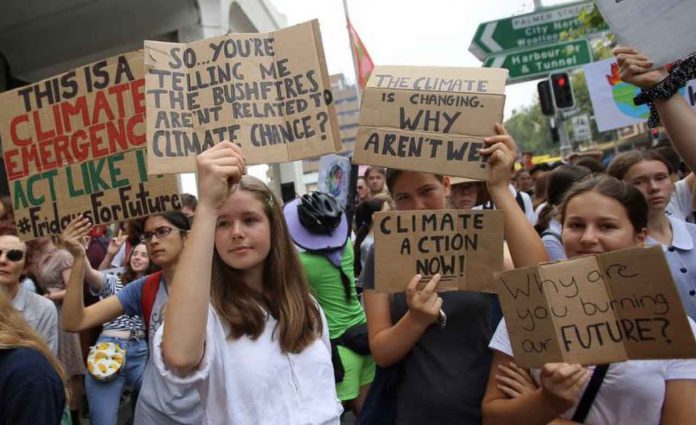
“Now more than ever in this COP (meeting), we will see a very big gap between the negotiations inside and the emotions outside,” says former Costa Rica representative at the talks
By Megan Rowling
BARCELONA (Thomson Reuters Foundation) – As young people take to the streets around the world again on Friday urging more action to curb climate change, analysts warn that the U.N. climate conference taking place over the coming two weeks will likely fall short of their expectations.
Swedish teenager Greta Thunberg has inspired a global movement of children who skip school on Fridays to hold marches and rallies demanding politicians treat climate change as an “emergency” and boost efforts to curb planet-warming emissions.
This Friday, groups of young Americans are planning a “Black Friday Strike”, from Los Angeles to New York, to boycott the celebration of consumer discount shopping and to advocate for “a change to business-as-usual to confront the climate crisis”.
Andrew Steer, who heads the U.S-based World Resources Institute, noted the rise of “people power” over the past year, with more than 7 million turning out for protests in September as the U.N. chief convened a summit to drive climate action.
“The issue is rising on the agenda, both in the United States and globally,” Steer told journalists ahead of the Dec. 2-13 U.N. talks in Madrid, known as COP25.
In Britain and the United States, political contenders have taken part in public debates on climate change ahead of planned elections.
Meanwhile, a growing number of governments at the national and city levels are declaring “climate emergencies”, joined on Thursday by the European Parliament.
Others, including small island developing states and some Latin American and African countries, have pledged to work on cutting their emissions to net-zero by mid-century.
But ahead of COP25, climate experts said the biggest-emitters – including the United States, Brazil, and China – would likely stay “missing in action” as opposition to winding down polluting fossil fuels sharpens among right-wing policymakers.
Former Costa Rica climate negotiator Mónica Araya said the “very best” that could be expected from COP25 was “a promise” that countries would upgrade their national climate action plans by the end of 2020, in line with the 2015 Paris agreement.
But that outcome would likely seem out of step with the “more angry, urgent moral narrative” shaped by youth-led popular climate strikes around the world since 2018, she noted.
“Now more than ever in this COP, we will see a very big gap between the negotiations inside and the emotions outside,” said Araya, founder of clean development platform Costa Rica Limpia.
Ahead of the Madrid talks, Spain’s Minister for the Ecological Transition Teresa Ribera said the meeting should mark “the start of a decisive year for climate ambition”.
It needed to lay the foundation for countries in 2020 to commit to cut emissions more steeply, as scientists advise, with the aim of limiting global temperature rise to 1.5 degrees Celsius, the lower goal set in the Paris accord, she said.
“This is what societies are demanding,” Ribera said, noting that efforts would be made to “try to ensure that the demands by young people to raise climate ambition echo throughout COP25”.
YOUTH VOICES
At COP events scheduled for next Monday and Thursday, young people will get a chance to voice their views about the need to protect the planet for their own and future generations.
Thunberg is sailing back to Europe across the Atlantic on a low-carbon journey to the climate conference after its venue was abruptly moved to Spain from Chile, which has been dogged by violent social unrest.
Young delegates at the U.N. climate negotiations have long complained their opinions do not carry enough weight.
In September, youth activists speaking alongside the U.N. summit in New York called on the United Nations and world leaders to give them a seat at the political table.
But some climate experts worry the last-minute venue switch for the COP25 talks may hamstring that broader participation.
Latin American activists said the cancellation on Chilean soil had disappointed many civil society groups, who could not afford to travel to Spain at short notice.
Araya said the change of venue had been “very painful” for them, with some fearing it would undermine a hoped-for focus on respecting the human rights of environmental defenders, a big issue in South America, which is rich in natural resources.
One thread uniting popular climate change movements around the world is a push for governments to take social equity into account when addressing the threat – a conversation that should start at COP25, analysts said.
Niranjali Amerasinghe, executive director of ActionAid USA, said justice issues should be key to climate responses, whether in ensuring a sustainable future for young people or helping poor communities hit hardest by wilder weather and rising seas.
“Those things resonate a bit stronger given the (global) political context,” she added.
(Reporting by Megan Rowling @meganrowling; editing by Laurie Goering. Credit the Thomson Reuters Foundation






